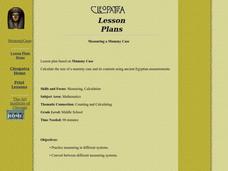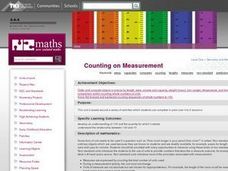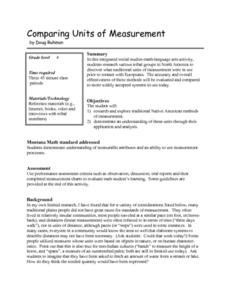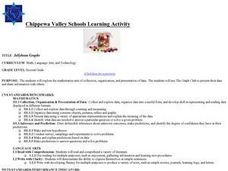Illustrative Mathematics
Hand Span Measures
How long is your hand span? Young mathematicians measure their hand span from pinky tip to thumb tip using a centimeter ruler. After rounding to the nearest whole centimeter, learners plot their data on a line plot.
Curated OER
Hand Span and Height
Is there a relationship between hand span width and height? Statisticians survey each other by taking measurements of both. A table that can hold data for 24 individuals is printed onto the worksheet, along with questions for analysis....
Curated OER
Shaquille O'Neal Hand/Foot Span: Student Worksheet
Here's a clever math learning exercise that has learners measure their hand span, foot length, come up with a ration, then use that information to figure out the hand span, and foot length of basketball giant Shaquille O'Neal. A good...
Math Learning Center
Grade 2 Supplement Set D5 – Measurement: Telling Time
Have your class play concentration memory games using analog and digital clocks. Second graders become little experts with time telling to the minute, quarter, half, and hour. Use as a fun Friday treat as well as other...
Curated OER
Measuring our Hands!
How do we compare? Get your scholars measuring using this interactive and kinesthetic math activity. First, learners compare something (you announce- could be index finger, palm, feet, etc.) to classmates. Consider having them record...
Curated OER
Measuring with Body Units
In this measuring with body units worksheet, students read examples of unusual units of length based on the body, then use these measurements to record estimated and actual length measurements of 5 common objects.
Radford University
Body Measurement Activity
Don't keep the resource at an arm's length. A hands-on activity has scholars measure the heights, arm spans, hair lengths, and foot lengths of their classmates. They create scatter plots to determine if there is a correlation between...
Curated OER
Measuring a Mummy Case
Learners calculate the size of a mummy case and its contents using ancient Egyptian measurements.
Curated OER
Nonstandard Measurement
Students find a partner with the same finger, arm and foot span as they have. In this nonstandard measurement lesson, students compare the length of their index finger, arm and feet. Students who don't match anyone find the...
Curated OER
Counting on Measurement
First graders explore measurement. They measure by counting non-standard units. Students use a variety of non-standard units to predict and measure volume of various containers using rice.
Curated OER
MEASURE ME
In this kinesthetic measurement worksheet, students are asked to measure their height, head circumference, lower arm length, calf circumference, hand span and little finger length. They are to choose a unit of measurement for each part...
Curated OER
Comparing Units of Measurement
Fourth graders investigate the units of measurement used by various Native American tribes before they had contact with the Europeans. They write research questions, conduct research using a variety of resources, in small groups write a...
Utah Education Network (UEN)
Insides and Outsides
Give small groups handfuls of unit cubes and then dare them to build as many rectangular prisms as possible using only 12 cubes. This engaging activity serves as an introduction to the volume of solid figures. In addition to volume,...
Curated OER
Measuring Ourselves
Fifth graders conduct various measurement activities on themselves and a partner. They measure their height, weight, thumb-to-pinky span, and body temperature, recording the information in the form of an Excel spreadsheet.
Curated OER
"How Do You Measure Up?"
Fourth graders explore basic measurements by analyzing their own bodies. In this human anatomy lesson, 4th graders identify the units used to measure a human body such as centimeters, inches, ounces and pounds. Students complete a...
Curated OER
Getting the Point!
Students explore the American cattle industry history. In this United States history and reading comprehension cross curriculum lesson, students read an article about the history of longhorn cattle, then answer comprehension questions on...
SeaWorld
How Big is a Blue?
Whales are all big, but some are larger than others! Kids will love sorting the 10 whale species by size at their desk (whale cut-outs provided). Next, use a whale rope to visualize how long each of these whales actually is. A large...
Curated OER
Why Standard Units?
A variety of units of measurement are taught in this math worksheet. First, students measure objects using their hands. Then, they use a ruler to gain more precise measurements in meters and centimeters. Nice worksheet!
Curated OER
The Hand of Chandra!
In this nebula instructional activity, students read about the Chandra X-ray Observatory that captured the given image of a pulsar and its nebula. Students solve 3 problems including using similar triangles and proportions to find the...
Curated OER
Volume of a Rectangular Prism
Children use the length, width, and height of an object to calculate the volume of a rectangular prism. They observe how to multiply three numbers at a time, and define volume. Pupils observe as the teacher demonstrates how to determine...
Odyssey of the Mind
Odyssey of the Mind Curriculum Activity: Shape-Shifter
Geometry is everywhere, and I mean everywhere! Those skillful mathematicians discuss shapes and then come up with a well-researched list of shapes seen in everyday applications. They put their knowledge of shapes to work as each small...
Utah Education Network (UEN)
If the Shape Fits
Geometers juggle the idea of polygons. Using a game and manipulatives, they make trapezoids and irregular polygons. They review the algorithms for finding the areas of squares and rectangles. On day one, they find the area of trapezoids,...
Curated OER
Jellybean Graphs
Second graders predict and graph data based on the color of jelly beans they think are in a handful. In this prediction lesson plan, 2nd graders will predict how many of each color jellybean are in a handful. Then they graph these...
Curated OER
Making Benchmards--Length
Students explore the idea of having Benchmarks to estimate the length of given objects. Students demonstrate acquired knowledge of the basic units of length by making reasonable estimates. Students create a personal benchmark.

























